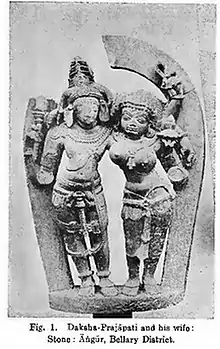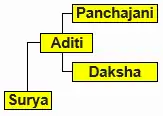Asikni (goddess)
Asikni (Sanskrit: असिक्नी, romanized: Asiknī, lit. 'the dark one' or 'night'), also known as Panchajani and Virani, is a Hindu goddess (devi), and the consort of Daksha, one of the Prajapati (agents of creation). Most legends describe her as the daughter of Virana or Panchajana and the mother of various children — 5000 Haryasvas, 1000 Sabalasvas and 60 daughters.[1] Asikni is sometimes equated with Daksha's other wife named Prasuti, but there are various texts mentioning both as Daksha's wives.[2][3]
| Asikni | |
|---|---|
The wife of Daksha | |
 Sculpture of Daksha and his wife. | |
| Other names | Panchajani, Virani, Virini |
| Devanagari | असिक्नी |
| Gender | Female |
| Personal information | |
| Parents | Virana or Panchajana (father) |
| Consort | Daksha |
| Children | |
Etymology
The word "Asikni" means "dark" or "not white". The word is used in the Rigveda (c. 1500 BCE) to describe the river Chenab.[4][5][6][7] It also refers to "night" or "a girl attending woman's appartment".[4][8] Asikni is known by different names in different texts, with "Panchajani" and "Virani" being the most prominent.[9][10] Both of these names are derived from her father's names. Panchajani also means "made of five elements".[11]
Birth and Marriage
Asikni's story is found in many Hindu scriptures with some variations related to her parenthood. Vettam Mani, a scholar, summarizes — Daksha, son of Brahma, helped the creation with his own mind; but he found that it was not conducive to the increase the number of the species and decided to produce offerings by the union of the male and the female. He married Virani or Virini, daughter of Viranaprajapati.[9] Mani also notes that the seventh Skandha of the Devi Bhagavata Purana also mentions the birth of Asikni. According to this version, Asikni was created by Brahma from his left thumb. Upon Daksha's request, Vishnu presented her as his wife.[9]
According to the text Bhagavata Puran, Daksha is appointed by Brahma to populate the world. This Daksha is the rebirth of Brahma's son in a different time period (Manvantara).[12] He is the son of an apsara (celestial maiden) named Marisha and the ten brothers called Prachetas[13][14] Initially, Daksha created many beings using his mind but found that it was not enough to increase the number of the species. He decided to reproduce through copulation and started to perform austerities to gain a wife. On Vishnu's advise, he married Panchajani, daughter of Panchajana and through their union, numerous children were born.[14][15]
Many scholars note that Daksha's wife appears as Prasuti in many Puranas.[2] It is sometimes assumed that Prasuti may be an epithet of Asikni. However, according to many scriptures including the Bhagavata Purana, Padma Purana, Linga Purana, Vayu Purana and Vishnu Purana, Daksha married Prasuti in his first birth, and Asikni during his second birth.[3]
Children

According to the most Puranic scriptures, after his marriage, Daksha produced five thousand sons through the womb of Asikni. They were collectively referred as Haryasvas. Like their father, they were also interested in increasing the species. One day, the divine wanderer sage, Narada, and questioned then how they could create people if they didn't knew the problems of the world. Narada asked them to first discover the worldly affairs. The Haryasvas left their father and never returned. Saddened by their lost, Daksha produced a thousand more sons (called Sabalasvas), but they too followed their brothers' path on Narada's advise.[9][10]
The number of Daksha's daughters are uncertain due to differences in the Puranic scriptures.[2] According to many texts including the Mahabharata (Harivamsa), the Devi Bhagavata Purana, Brahma Vaivarta Purana and the Vishnu Purana, Daksha and Asikni had 60 daughters. They were married to different deities, becoming the progenitors of various species.[16][17]
- 10 (Maruvati, Vasu, Jami, Lamba, Bhanu, Urjja, Sankalp, Mahurath, Sadhya, Vishva) of those daughters were married to Dharma
- 13 (Aditi, Diti, Danu, Arishta, Surasa, Surabhi, Vinata, Tamra, Krodhavasha, Ira, Kadru, Vishva, Muni) to sage Kashyapa
- 27 (Ashvini, Bharani, Krttika, Rohini, Mrigashira, Tarakam or Ardra, Punarvasu, Pushya, Ashlesha, Janakam or Magha, Phalguni, Uttarphalguni, Hasta, Chitra, Svati, Vishakha, Anuradha, Jyestha, Mula, Purvashadha, Uttarasadha, Srona or Shravana, Dhanistha or Shatabhisha, Abhijit or Prachetas, Purvabhadrapada, Uttarabhadrapada and Revati) to Chandra
- 4 to Arishtanemi
- 2 to Bahuputra
- 2 to sage Angiras
- 2 to Krisasva
However, the Brahma Purana mentions only 50 daughters.[2] The Matsya Purana, the Shiva Purana and the Kalika Upapurana add Sati as her daughter,[18][19] but other texts including Devi-Bhagavata Purana mention Prasuti as mother of Sati.[20]
References
- Dalal, Roshen (2014-04-18). The Religions of India: A Concise Guide to Nine Major Faiths. Penguin UK. ISBN 978-81-8475-396-7.
- Debroy, Bibek (2005). The History of Puranas. Bharatiya Kala Prakashan. ISBN 978-81-8090-062-4.
- Purāṇam. All-India Kasiraja Trust. 2001.
- Monier-Williams, Sir Monier; Leumann, Ernst; Cappeller, Carl (1899). A Sanskrit-English Dictionary: Etymologically and Philologically Arranged with Special Reference to Cognate Indo-European Languages. Motilal Banarsidass Publishing House. ISBN 978-81-208-3105-6.
- Jayantakr̥ṣṇa Harikr̥ṣṇa Dave (1991). Immortal India, Volume 4. Bharatiya Viyda Bhavan. p. 115.
Asikni means black in colour and this refers to the dark waters of river Chenab . In Rigveda X75-5 , Asikni is also mentioned along with other rivers.
- Gopalakrisna N. Bhat (1992). Vedic Nighantu: A Critical Study, the Oldest Indian Treatise on Etymology. Mangalore University. p. 60.
Asikni means non-bright, non-white.
- Gandhi, Maneka (1993). The Penguin Book of Hindu Names. Penguin Books India. ISBN 978-0-14-012841-3.
- A Sanskrit-English Dictionary: Etymologically and Philologically Arranged with Special Reference to Cognate Indo-European Languages Asiknī
- Puranic Encyclopedia: a comprehensive dictionary with special reference to the epic and Puranic literature, Vettam Mani, Motilal Banarsidass, Delhi, 1975, Asikni II.
- "SB 6.5: Narada Muni Cursed by Prajapati Daksa Srimad-Bhagavatam". PrabhupadaBooks.com. Retrieved 2021-01-31.
- Vijay Kumar (2005). Baby Names for Girls. Lotus Press. p. 65.
- Sinha, Purnendu Narayana (2020-09-28). A Study of the Bhagavata Purana: Or, Esoteric Hinduism. Library of Alexandria. ISBN 978-1-4655-2506-2.
- Prabhupada, His Divine Grace A. C. Bhaktivedanta Swami (1974-12-31). Srimad-Bhagavatam, Fourth Canto: The Creation of the Fourth Order. The Bhaktivedanta Book Trust. ISBN 978-91-7149-637-9.
- Prabhupada, His Divine Grace A. C. Bhaktivedanta Swami (1975-12-31). Srimad-Bhagavatam, Sixth Canto: Prescribed Duties for Mankind. The Bhaktivedanta Book Trust. ISBN 978-91-7149-639-3.
- "SB 6.4: The Hamsa-guhya Prayers Srimad-Bhagavatam". PrabhupadaBooks.com. Retrieved 2021-01-31.
- Debroy, Bibek (2016-09-09). Harivamsha. Penguin UK. ISBN 978-93-86057-91-4.
- Kapoor, Subodh (2004). A Dictionary of Hinduism: Including Its Mythology, Religion, History, Literature, and Pantheon. Cosmo Publications. ISBN 978-81-7755-874-6.
- Kramrisch, Stella (1988). The Presence of Siva. Motilal Banarsidass Publ. ISBN 978-81-208-0491-3.
- For translations, see
- The Matsya Puranam P-I (B.D. Basu) English Translation Ch #5, Page 18
- Matsya Purana (Sanskrit) Ch #6, Sloka 1-2
- Matsya Purana (Sanskrit) Ch #5, Sloka 15-16
- The Matsya Puranam P-I (B.D. Basu) English Translation Ch #5, Page 17
- Matsya Purana (Sanskrit) Ch #5, Sloka 10-12
- Ramaswamy, Krishnan; Banerjee, Aditi (2007). Invading the Sacred: An Analysis of Hinduism Studies in America. Rupa & Company. ISBN 978-81-291-1182-1.
External links
| Wikimedia Commons has media related to Panchajani. |
